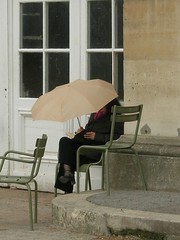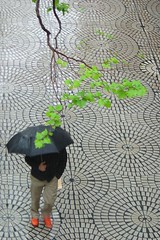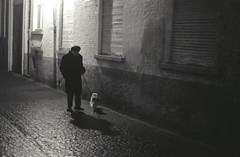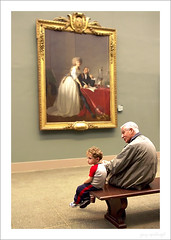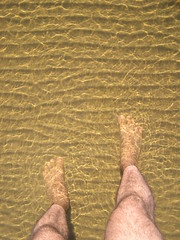Passion
She was fifteen years old when she fell in love. Not with a boy, but with her city. Among her grandfather's musty old books she discovered a history of her city, published in 1893. In the photographs she recognized the small church three blocks away and the docks by the river and the old bridge.
She discovered she lived in a city of romance and intrigue, a city of martyrs and corrupt authorities, a city of commerce in which trade goods and flesh were bartered and sold with equal relish and profit, a city of churches and temples and brothels and slave markets. With her grandfather's book as her guide, she toured the city.
Here in 1844 the mayor stood trial for murdering his mistress (after his acquittal he was twice re-elected to office). There stood the Cathedral of Saint Michael which caught fire in 1815 and burned to the ground, destroying several blocks of shops and houses as well (money was raised to re-build the cathedral, but the banker entrusted with the funds disappeared, rumored to have fled to South America). By the river she believed she discovered the site of the old tannery, the enterprise around which the city grew, now the home of a sleek riverside shopping center.
She scoured the local library and used book shops in search of other histories of the city, and with each discovery she fell deeper in love. She paid court to the city's history and the city wooed her in return. She grew older, she dated, became engaged, called the engagement off, married another man, divorced him, re-married, raised children, grew bored with her husband. And throughout it all her passion for the city never faltered.
Even now she walks to the market accompanied by scoundrels and escaped slaves. She visits the library in the town square and hears the hoofbeats of the militia and the panicked cries of revolutionaries as they flee. She hears the church bells on Sunday mornings and she can almost recall their ringing to celebrate the end of a war that took place long before she was born. She sits outside in the rain, an umbrella over her head and a book in her fist, listening to the clack of horse-drawn carriages carrying duelists to their dawn rendezvous.
Saving the World
He walks in the rain to save the world. His people are from the desert, but he walks under an umbrella in the rain. His great grandfather came from Yemen; his grandfather and father were born in a village west of Doha in Qatar; he himself was born in Abu Dhabi in the United Arab Emirates. He thinks of himself as a child of the desert, though his parents moved to the United States when he was three.
He walks in the rain as a form of prayer. Although his people came from the desert, he lives in a land where water falls out of the sky. When he hears others pray to God asking for miracles he thinks, 'Your prayers are already answered; you are surrounded by miracles. Look, and be astonished.'
In the markets he sees tabloid newspapers proclaiming miracle cures for cancer, announcing the birth of babies with ears like bats, displaying photographs of carved faces on other planets. He imagines a headline reading 'Water Falls From Sky! Experts Baffled!' Nothing in those tabloids could be half as amazing as the existence of rain.
The water molecules that condense overhead and fall on the people and streets of Portland, Oregan could be molecules that evaporated in the Persian Gulf between the United Arab Emirates and Qatar. Or they could be from a tarn in Scotland, a pond in Uruguay, or a river in China. A miracle is no less a miracle because it is silent, a miracle is no less a miracle because nobody notices.
As he walks in the rain, each drop that thumps against his umbrella is a call to prayer as clear and musical as the song of the muezzin. Each raindrop that spatters on the pavement is as sweet and fervent as the chant of monks. After the rain stops, as the sun emerges and the puddles dry, he believes his prayers are carried up with the evaporated water molecules and spread throughout the world.
The Man with the Little Dog
They only see an old man walking the dark street with a small, arthritic, weak-bladdered dog. They can't know the young dandy with the waxed mustache who danced through the night at Carnival and once spent his entire week's pay on cut flowers which he strewed in front of the door of a girl with flashing eyes with whom he was in love for two months.
They can't know the young soldier who wore his country's uniform with resolve, if not pride; who tended to close his eyes when he fired his weapon and who hoped he would be brave if it turned out to be necessary but feared he would simply be practical; who, by the grace of God or good fortune, was spared having to be either brave or practical by spending the last months of the war in the infirmary after contracting dysentery from eating unwashed fruit.
They can't know the young man who returned home after the war and took a job with an ink maker, who fell passionately in love with a lively young beauty named Lotte and wooed her desperately, who shaved off his fine mustache when she complained it tickled, who briefly considered suicide after she rejected him because she was embarrased by his ink-stained fingers, and who eventually married a pleasant woman with a kindly face whose fiance had died during the war.
They can't know the devoted father who loved his two daughters but never understood them, who always felt awkward and clumsy around them, who took a second job to pay for their music lessons and to save for their weddings. They can't know the good husband who grew more deeply in love with his wife each year and who softly kissed his wife every night after she fell asleep and whispered to her "I love you so very much," and whose dreams were filled with flower-strewn hallways and dark-eyed Lotte held with unstained fingers.
They can't know the widower who lives alone on an adequate pension with the small dog his youngest daughter couldn't take with her when she moved, who gives the dog the affection he was unable to show his daughters, who laughs at the little dog's excited barking when he shuffles a few tottery dance steps in the living room, and who has decided once again to let his mustache grow.
In a Painting
"Grandpa?"
"Yes?"
"Grandpa?"
"What?"
"Grandpa?"
"Yes, what is it?"
"Grandpa, why are all of grammy's friends so old?"
"Well, grammy is old too, you know. So am I. So of course most of our friends are old."
"I'm not old."
"No, you're not."
"And I'm your friend."
"You're my best friend."
"Grandpa?"
"Yes?"
"Grandpa?"
"What is it?"
"Grandpa, that woman in the picture has funny hair."
"It's a painting, not a picture. But yes, she has funny hair. There was a time, though, long ago, when everybody had funny hair like that."
"Did grammy have funny hair like that?"
"Grammy's not
that old."
"How old is she? The woman in the picture."
"Oh, I don't know. Three hundred years, maybe."
"Three hunnert? She's really really really old."
"No, no...the painting is probably three hundred years old. Not the woman."
"How old is the woman?"
"I don't know. She's long dead by now."
"Grandpa?"
"Yes?"
"Grandpa?"
"Yes, what is it?"
"Grandpa?"
"What?"
"Grandpa, are you and grammy going to be dead?"
"Yes, someday."
"In three hunnert years?"
"Probably before that."
"A hunnert years?"
"Probably before that too."
"Will you be in a painting when you're dead?"
"Probably not."
"You should be. That'd be cool."
"Yes, it would. But I'd rather be here with you."
"Me too. Grandpa?"
"Yes?"
"Grandpa?"
"What?"
"When you're dead I'll put you in a painting."
"Thank you."
Wobbly
I was 19 years old the first time I saw the ocean. For real, not on television. We don't have any oceans in Oklahoma. You don't get a real sense of the size of it on television. I'm not sure you can even get a real sense of the size in person. It's a lot of water.
What I liked best was standing barefooted in the shallow water, letting the littlest waves run up over my ankles. When the waves wash back out, they suck the sand out from under your feet. It feels weird and makes you all wobbly.
My battalion was shipping out for Iraq. I don't know why they call it 'shipping out.' We weren't going by ship. They gave us a couple days of leave before we shipped out, so some of us went to see the ocean.
Five days later I was in Iraq. Twenty-two days after that a humvee up near the front of the convoy got zapped by an IED. We all went to help and that's when the secondary IED went off.
IED. Improvised explosive device. They call it that, I think, because all those syllables makes it seem more technical and less personal. It's a fucking booby trap, is what it is. I don't know why they just don't say that. I'm really starting to hate words with lots of syllables.
Here's another one. Traumatic amputation. That means you got your leg blown off.
They shipped me out by plane again. This time to a hospital in Germany. In six weeks I went from Oklahoma to California to Kuwait to Iraq to Germany. Must be three quarters of the way around the whole world.
The doctors and nurses tell me I'll learn to walk as good as before. The doctors say I'll probably experience some somatosensory discomfort. The nurses call it phantom pain. What it means is my leg will probably ache, even though my leg is just a pile of mush somewhere in Iraq.
I kind of hope they're right, because right now I don't feel much of anything. Except when I sleep. Then I dream about standing barefooted in the shallow water of the ocean while the waves wash the sand out from under my feet, making me feel all wobbly.
Ambition
No ambition, that's what they said about him. Coulda been somebody. Went to a good college, got a scholarship to Cornell Law, published an article in Law Review, got an offer to clerk for State Supreme Court judge, got offers from firms in New York City.
What'd he do? Moved right back to Abbeville, SC, opened a dinky little two room office. Wasn't much law to do in Abbeville, and that suited him fine. He'd write you up a will if you asked. Defend you if got a little sideways on a Friday night and put your pick-up in the ditch. Help you settle a fuss with your landlord. Speak for you in divorce court. Sue that lying sumbitch who said he fixed your roof but didn't.
He was the type of lawyer who put his home phone number on his business card. He subscribed to dozens of magazines. He wasn't very selective; anything being pushed by Publisher's Clearinghouse. People, Newsweek, Family Circle, Ebony, Seventeen, National Geographic...didn't matter. Different magazines every year. When he didn't have clients, he'd sit behind his desk and read, slowly turning the pages and thinking about what he'd read.
Most of his clients paid at least part of the fee he charged. The ones who didn't pay, he just never worked for them again. The type of client who didn't pay anything, he said, was the type that'd need more legal work in the future. Tough on them.
He didn't get rich, but he made enough to marry, buy a house on the edge of town, and raise a family. A daughter who became a dentist in Savannah, a son who went into real estate on the coast. He could have retired, but he enjoyed going to his little office and sitting behind his desk. Reading his magazines.
He died in his car. Left the house at the usual time, but when his wife didn't hear the sound of the car backing out of the drive, she looked out the window. Saw him slumped over in the driver's seat. Died before he could start the car.
His son cleaned out his office. Some of the furniture was sold at auction. Most of it never drew a bid. His wife renewed the magazine subscriptions.
What It Says
She has a relationship to water. She knows this to be true; it's something she thinks about in the quiet moments, but has never quite been able to articulate.
Her dreams...the fragments she can recall on waking...are all of water. Images of lily-dotted ponds, of brooks teeming with speckled trout, of dhows with white wing-shaped sails on wide dark green rivers. Sometimes, on waking, she remembers the ocean, foam-tossed and primal, which she has never seen in person. Not just the image of the ocean, but the smell and taste.
She knows her body is more than 60% water, she knows water comprises 70% of her brain and 80% of her blood; she knows water covers more than 70% of the earth, and she finds strange solace in that knowledge. The water in her blood responds to the cycles of the moon just as the tides do.
Is it surprising, then, that in her waking life she is drawn to water? Is it surprising that it speaks to her? Not in words, but in images and ideas, in concepts and queer fluid impressions. She sees the floating feather, the drifting leaf, the shifting patterns of surface-skimming insects as an ornate, organic calligraphy that's almost...
almost...legible.
She wonders what it says.
